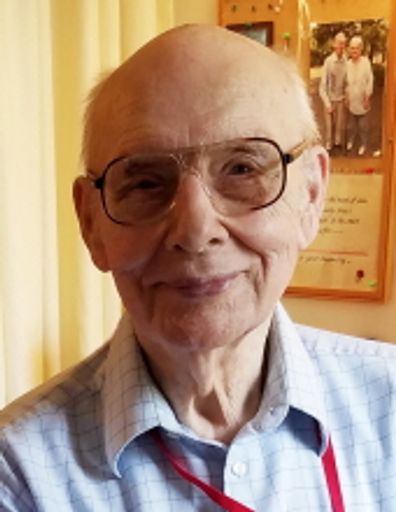

Karl-Heinz W. Evers
October 7, 1927 — August 3, 2018
Karl-Heinz Willi Evers: immigrant, lifelong teacher, devoted husband, loving father
Karl-Heinz Willi Evers, 90, passed away on Friday, August 3, 2018 at the Minnesota Veterans Home in Luverne, MN. He had just recently moved to the veterans’ home at the end of June. Karl was born on October 7, 1927 in Kiel Germany. His parents were Henny Magdalene Evers (Brandt) and his father was Waldemar Johann Heinrich Evers. Karl had one sister, Waltraud Lage.
Karl grew up in the northern German harbor town of Kiel in the state of Schleswig-Holstein, between the North Sea and the Baltic Sea. His father was a shoe-maker and his mother was a homemaker. Although Kiel was a busy harbor town, Karl fell in love with flying. At the age of fourteen he earned his glider pilot rating in 1941 and he completed over 200 glider flights!
For parts of World War II, he and his sister were evacuated from Kiel to live and go to school in Austria in order to be safe from the Allied strategic bombing of Kiel. As a major port for U-boats, Kiel was a key Allied target. Over 80% of the city was completely destroyed. His home in Kiel was bombed three times. His father served as a combat medic for an infantry unit on the eastern front. In 1943 his father was MIA and spent several years as a POW forced to work in Russian coal mines. Eventually Karl was homesick and returned to Kiel to start his machinist apprenticeship (March 1942 – October 1944). In the summer of 1943, Karl was wounded during a day time bombing; he was awarded the equivalent of a German purple heart. At the age of 17, Karl joined the German Luftwaffe Academy as a cadet being trained as a fighter pilot to fly the Messerschmitt ME 109. His training was conducted near Stolpmunde Germany (in Polish occupied territory). He completed 150 hours of fighter pilot training, but he never flew in combat.
As Russian tanks were heading for Berlin, Karl’s Luftwaffe academy training class was closed on April 4, 1945 – just one month before the Allied victory ending of the war in Europe. He was given three choices: join the SS, the paratroopers or the infantry. Karl chose the lesser of those three evils, the infantry. By night he was sent via train to southern Germany. His infantry unit was captured by Patton’s troops on the outskirts of Traunstein Bavaria on May 4th, 1945. The war ended three days later. He spent over 17 months as a POW, initially in Salzburg, Austria and then mostly at the Erding Air Depot in Germany. He was discharged from the POW camp in October 1946.
Because of his skill in speaking both German and English, Karl worked for the American Army (862nd Engineer Aviation Battalion). Karl eventually got his Visa to immigrate to America. Before leaving his homeland, Karl briefly went back to Kiel, at that time his father was still MIA and presumed dead. After five years (1948), Karl’s father, Waldemar, came home from his Russian POW. With the help of his Uncle, Bruno Busch, at the age of 24 Karl immigrated to the US, to Duluth, Minnesota (1951). He came to this country with an 8th grade education and only $30 in his pocket. After working for a few months, he saved enough money so he could start his civil engineering education at the University of Minnesota Duluth. During his schooling, he held many part-time jobs: surveyor’s helper, hotel desk clerk, Santa Claus in a department store, grocery store clerk, short-order cook, warehouse clerk, etc., he completed his Associate’s degree in 1954.
He was drafted after the Korean War. Because of his foreign language skills and knowledge of German culture, Uncle Sam sent him to the 49th Engineer Battalion, 7th US Army Europe, Nellingen, Kaserne. So here is a former German Luftwaffe cadet, returning to his homeland wearing the uniform of his captors! He served in the US Army from 1954 until 1957. While overseas, he met his first wife, Heidi, and was married in December 1955. On November 14, 1955 in the US Consulate office in Frankfort, Germany, Karl became a naturalized citizen of the United States of American. After he was honorably discharged from the US Army, Karl & Heidi (and his adopted daughter Susanne) moved to Duluth, MN.
With the help of the GI bill, he continued his education at the University of Minnesota. In 1958 he started his first teaching job at Lester Park Elementary School. He earned his Bachelor’s degree in 1959. In fact, he spent 19 years working on his education. He received his Master’s degree in 1962 and his PhD in 1970. His major professor for both his MA and PhD was Professor Emma M. Birkmaier. As a lifetime educator, Karl has taught classes ranging from pre-school foreign language, public school instruction, all the way to graduate foreign language studies. He finally retired from teaching German language and culture in 2009 (after working many years at the College of Idaho [also known as Albertson’s College], Caldwell Idaho).
Karl and Heidi had two children that were born in Duluth, MN, Thomas Karl and Kornelia “Connie” Brigitte. Karl’s family moved to Marshall, MN in 1970. Karl held many positions at the university in Marshall. His wife died in 1977. In 1978, Karl met his second wife-to-be, Jan, at a weekend “Beginning Experience” retreat. BE is a grief resolution program for widowed and divorced individuals. Karl and Jan married in 1980 in Worthington, MN. Karl and Jan were happily married for over 37 wonderful years. They traveled stateside and overseas, camped in their pop-up camper, enjoyed the mountain west, and lived in several states including MN, WI, WA, ID and NM.
In addition to working on his education, Karl also continued to serve in the US Army Reserve. Karl retired as an E-8 Master Sergeant on June 23, 1990. He served for over 23 years in a wide variety of Army Reserve units in multiple states. Most recently he was a teacher/instructor for advanced noncommissioned officer training in an Army Reserve school.
Karl had a lifelong love of music. At the age of five he received a Hohner Button accordion from his father for Christmas. He loved that instrument and he learned to play it quickly. He also played the harmonica. That accordion was lost during WW II when his house was bombed. He eventually got another accordion, and Karl donated that accordion to the War Hawk Museum in Nampa, Idaho as part of a display case on Karl’s life. Karl loved all kinds of music, especially classical and opera. While a resident at the veterans’ home, he was part of a choir that Pastor Tom Voigt led (First Presbyterian Church, Edgerton MN). It is interesting to note that Karl had previously worked at Fey Industries which is also located in Edgerton.
He is survived by his wife, Jan of Aztec, NM; son, Thomas (Marianne) of Paducah, KY; daughter, Connie (Craig) Lindsay of Marshall, MN; adopted daughter, Susanne of Cloquet, MN; step-son, Mike (Sue) Johnson of Bayfield, CO; step-son, Eric (Michelle) Johnson,of Driggs, ID; step-son, Hal (Pat) Johnson of Hudson, WI; grandson, Jonathan of Louisville, KY; granddaughter, Laura of Memphis, TN; step-granddaughter, Melinda (Joel) Wright of Portland, OR; step-granddaughter, Kristina (Josh) Puls of Aztec, NM; step-grandson, Jacob Johnson of Mexico; step-grandson, Caleb Johnson of St. Paul, MN; step-granddaughter, Brianna of Ashland, WI; and step-granddaughter,
Kathryn Byers of Paducah, KY.
Romans 15:5-7, “May the God of steadfastness grant you to live in such harmony with one another, in accord with Jesus Christ, that together you may with one voice glorify the God and Father of our Lord Jesus Christ. Welcome one another, therefore, as Christ has welcomed you, for the glory of God.” Romans 15:5-7, “Der Gott der Geduld und des Trostes gebe euch, eines Sinnes unter einander zu sein, nach Christi Jesu, auf dass ihr einmutig, mit einem Munde lobet Gott und den Vater unsers Herrn Jesu Christi. Darum nehmet euch unter einander auf. Gleich wie auch Christus euch aufgenommen zu Gottes Ehre!”
“Those who bear the mark of pain are never really free; they owe a debt to the ones who still suffer…”
Albert Schweitzer
The Word – a poem by Rose Auslander (1901-1988)
Am Anfang
war das Wort
und das Wort
war bei Gott.
Und Gott gab uns
das Wort
und wir wohnen
im Wort
Und das Wort ist
unser Traum
und der Traum ist
unser Leben.
In the beginning
was the Word
and the Word
was with God.
And God gave us
the Word
and we live
in the Word
And the Word is
our dream
and the dream is
our Life.
“Whatever you can do, or dream you can begin it. Boldness has genius, power and magic in it” Goethe
Guestbook
Visits: 51
This site is protected by reCAPTCHA and the
Google Privacy Policy and Terms of Service apply.
Service map data © OpenStreetMap contributors


